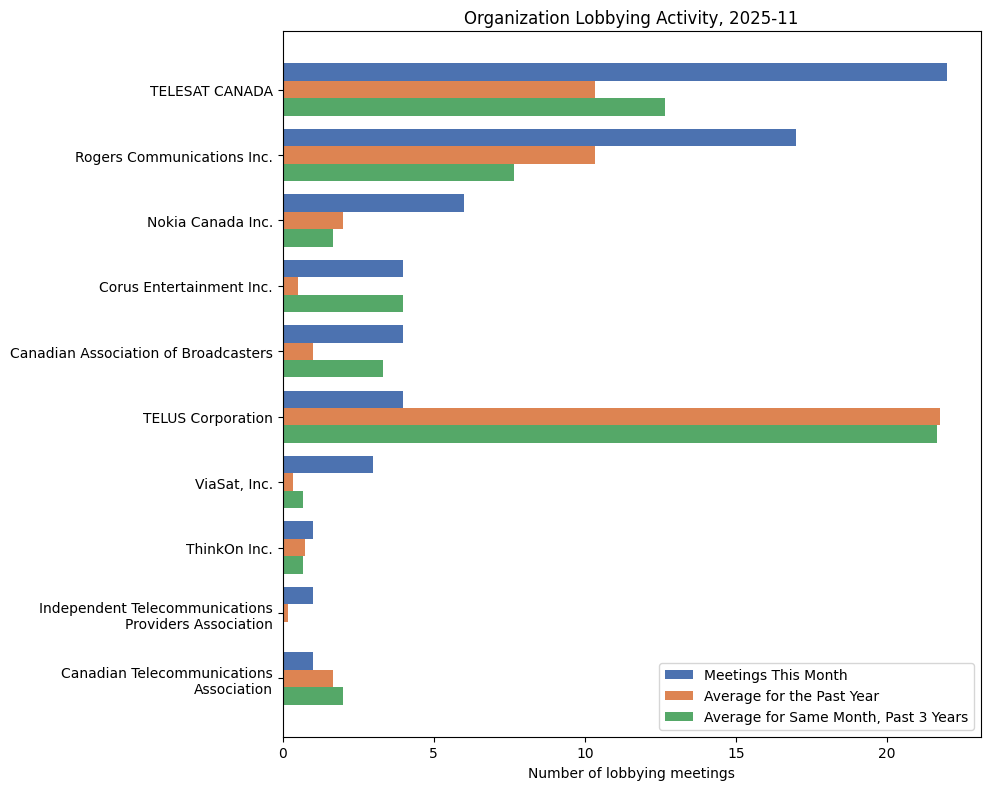QSA's Week in Telecoms (#42, 2025)
CRTC updates on broadband fund and MVNO access; Auditor General report on federal cybersecurity; Senate hearings review age assurance tech and CBC digital strategy; U.S. marks Cybersecurity Awareness Month.

Good morning! This is Queen Street Analytics' weekly roundup of regulatory developments, legislative discussions, political announcements and other government-related news concerning cellphone and wireless carriers, ISPs, satellite communications, broadband access, 5G, remote communities, and CRTC spectrum licences. Every Monday, we break down the most important updates in this space in under five minutes.
Want to track other GR news in adjacent industries? Don’t miss this week’s updates in ICT & Cybersecurity and Utilities & Power.
Dates: 2025-10-19 to 2025-10-25
📋 In This Week's Newsletter
• 🏛️ This Week's Parliamentary Committee Calendar
• 🇨🇦 Canadian Federal GR News
• 🗺️ Canadian Provincial GR News
• 📚 What We're Reading This Week
This Week's Parliamentary Committee Calendar
- Public Safety and National Security Committee: Bill C-8, Cybersecurity and Telecommunications Reform: The House of Commons Public Safety and National Security Committee will review Bill C-8, addressing cybersecurity reforms and amendments to the Telecommunications Act, on October 28 from 11:00 a.m. to 1:00 p.m. Scheduled witnesses include representatives from Industry, Public Safety, and the Communications Security Establishment.
Canadian Federal GR News
CRTC Outlines Progress on Broadband Fund and Internet Competition
Vicky Eatrides, Chairperson and CEO of the Canadian Radio-television and Telecommunications Commission (CRTC), addressed the Canadian Chapter of the International Institute of Communications in Ottawa, detailing advancements in broadband and wireless connectivity across Canada. Over $750 million from the CRTC's Broadband Fund has supported projects delivering Internet or cellphone services to nearly 50,000 homes in 290 communities, improving connectivity in critical institutions and extending fiber across 5,500 kilometers of the country. The Commission streamlined the application process for the fund last December and expects new funding decisions shortly. Eatrides described regulatory reforms to encourage Internet competition: wholesale rates were lowered and interim access to large telephone companies' fiber offered, with a five-year build window for new fiber before access is mandated. MVNO rules allow regional cellphone providers entry into new markets with a seven-year requirement to build out their own networks.
Sources: Announcements: www.canada.ca

Federal Government Responds to Auditor General Cybersecurity Report
The Honourable Joël Lightbound, Minister of Government Transformation, Public Works and Procurement, and Honourable Shafqat Ali, President of the Treasury Board, issued a joint statement following the Auditor General’s Audit of the Cyber Security of Federal Government Networks and Systems. The government reiterated its commitment to protecting the digital infrastructure supporting essential services for Canadians, acknowledging the Auditor’s recommendations for bolstering resilience and security. Agencies including Shared Services Canada, the Treasury Board Secretariat, and the Communications Security Establishment are working to modernize systems, invest in advanced technologies, and enhance real-time threat detection. Federal digital services currently block billions of malicious activities daily. The government plans coordinated action across departments, further informed by the audit’s recommendations.
Sources: Announcements: www.canada.ca
Senate Committee Reviews Bill S-209: Online Age Verification for Pornography
The Standing Senate Committee on Legal and Constitutional Affairs convened to examine Bill S-209, which would limit young people's online access to pornography. William Darrell Kingston of the Digital Governance Standards Institute discussed national standards for age assurance technologies, suggesting formal recognition of compliant systems by the Governor-in-Council. Jeanette Patell from Google Canada advocated for risk-based age assurance mechanisms and amendments clarifying the bill’s scope to affect pornography providers, not search engines. Senators raised questions about enforceability and privacy, with Michael Geist questioning the bill’s breadth and its implications for data protection. Further expert testimony addressed online harms and cultural impacts. Witnesses agreed on the need for actionable legislative definitions and safeguards against data breaches. The committee requested written submissions for additional feedback.
Sources: Transcripts: senparlvu.parl.gc.ca
Senate Committee Evaluates AI-Based Age Assurance for Online Content
The Standing Senate Committee on Legal and Constitutional Affairs continued its focus on age assurance and verification technologies, inviting industry representatives such as Iain Corby (AgeAware), Jean-Michel Polit (AI-based age verification), and Ms. Dawson (Yoti). Discussion centered on privacy-preserving solutions, tokenized and interoperable age checks, and concerns about ethnic bias in AI-driven systems. Global adoption trends and compliance with data protection laws like GDPR were noted, with emphasis on accountability for companies deploying such technologies. The committee also received input on alternative verification methods, extraterritorial enforcement, and technical reliability. Regulators such as Ofcom are in ongoing dialogue with these providers.
Sources: Transcripts: senparlvu.parl.gc.ca
Senate Committee Assesses CBC/Radio-Canada’s Local Service Strategy
The Standing Senate Committee on Transport and Communications heard CBC/Radio-Canada executives outline strategic plans for local service enhancement, digital agility, and community engagement. Leaders described adaptation efforts for outreach to children, youth, and newcomers via tailored platforms and local content delivery. The committee discussed resource sharing between French and English networks, the role of AI in news production, and increased programming through new podcasts and streaming channels. The session addressed challenges arising from advertising competition with global digital platforms and CBC’s relationship with private media. The corporation covered efforts to serve francophone minority communities and noted the impact of funding uncertainty on operational priorities.
Sources: Transcripts: senparlvu.parl.gc.ca
Senate Committee Discusses National Security and Cyber Policy
Minister Gary Anandasangaree appeared before the Standing Senate Committee on National Security, Defence and Veterans Affairs to report on border security, organized crime, cybersecurity, and public safety investment. The minister outlined a $1.3 billion border plan and highlighted the near-term completion of regulations under Bill C-21. On cybersecurity and disinformation, the government is implementing education campaigns and establishing a commissioner under Bill C-70, with interagency efforts led by CSIS, RCMP, and Global Affairs. The committee received updates on RCMP funding, recruitment strategies, and Indigenous safety models. Bill C-2 and Bill C-12 prompted debate about privacy and citizen rights.
Sources: Transcripts: senparlvu.parl.gc.ca
US Federal GR News
President Declares National Cybersecurity Awareness Month
The President issued Proclamation 10985, marking October 2025 as National Cybersecurity Awareness Month. The announcement cited a recent Executive Order focused on critical protections against foreign threats, securing software development, adopting encryption standards, and directing federal efforts in artificial intelligence for vulnerability detection. The proclamation referenced the bipartisan TAKE IT DOWN Act, which strengthens protections against non-consensual online exploitation of children. The administration cited its efforts to ease regulatory burdens and boost investment in the technology sector. Measures encourage adoption of security best practices across personal and organizational devices, alongside expanded training and education for national resilience. Companies and citizens were called to participate in observance activities.
Sources: U.S. Federal Announcements: www.federalregister.gov
Canadian Provincial GR News
Quebec Adopts Digital Identity Legislation
The Quebec National Assembly passed Bill No. 82, establishing a framework for digital identification of citizens and reinforced cybersecurity incident reporting for essential infrastructures. The law also positions the Ministry of Cybersecurity and Digital as key authority for telecom network development.
Sources: Provincial Announcement: www.quebec.ca
Quebec Enacts New Civil Security Act for Disaster Communication
Quebec enacted a new Civil Security Act, replacing prior legislation and setting dedicated rules for emergency communication centers and forest fire protection oversight.
Sources: Provincial Announcement: www.quebec.ca
What We're Reading This Week
- Why the AWS outage exposed the risks of depending on a single company | CBC News: Recent AWS service disruptions spark discussion about market concentration risks for cloud reliability.
- British Columbia proposes new power rules for AI, data centres: Proposed provincial regulations will guide electricity allocation to AI and data centre operations.
- B.C. gov't proposes new power rules for AI, data centres: BC signals regulatory changes for power use in AI and data centre infrastructure.
- Auditor finds gaps in federal government’s cybersecurity shield as threats multiply: Auditor General’s findings identify persistent vulnerabilities across Canadian government IT systems.
- ‘Data is the new oil.’ Why is Canada thinking so small when it comes to big science infrastructure?: Commentary examines domestic data infrastructure strategy in comparison to international investments.
- Major vulnerability exposed in Amazon’s global internet outage: Details on the recent Amazon outage point to significant weaknesses in worldwide cloud infrastructure.

